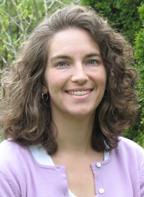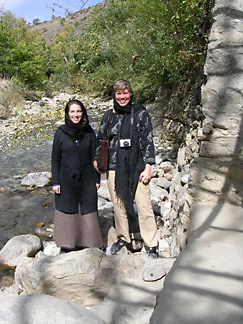Cornell opens doors for Emily Levitt to study malnutrition in Afghanistan
By Jeannie Griffith

As a teenager growing up in Rochester, N.Y., Emily Levitt decorated her room with flags of the world and dreamed of reducing human suffering by working for the United Nations. Now a doctoral candidate in Cornell's Program in International Nutrition, she is putting her idealism and experience to the test in one of the most un-united nations on Earth: Afghanistan.
"I always said, 'poor, not war': I'll work in a place that's poor, but not where there's war," she said as she was preparing for her May 27 departure. "That's been thrown out the window. Malnutrition, unfortunately, seems to be tightly correlated with war, so maybe it was just a matter of time."
A summa cum laude Cornell graduate with B.S. (1999) and M.S. (2003) degrees combining nutrition and international development, Levitt cut her "in-country" teeth on a series of extended classroom hiatuses in Bolivia, Haiti and Senegal. She has been to Afghanistan twice already, and she has learned enough Persian to make her needs understood, though she will still need to travel with an interpreter.
Afghanistan presents unusual challenges, even for a seasoned, determined world citizen like Levitt. Aside from the chronic political unrest and the cultural impediments she will face as a woman, the mountainous terrain, bomb-cratered roads, disrupted electricity and water supplies and ever-present landmines are perpetual hindrances to progress. After 30 years of alternating war and civil conflict, all but 2 percent of the land has been deforested, the worst drought in perhaps 60 years has claimed up to 95 percent of the livestock, and one in five children dies before reaching age 5.

In early 2005, Levitt spent three months consulting in Afghanistan for Tufts University to help develop a department of nutrition at the Afghan Ministry of Public Health. Last October she returned with her Cornell committee chair, Alice Pell, professor of animal science and director of the Cornell International Institute for Food, Agriculture and Development, and institute members Peter Hobbs, professor of crop and soil sciences, and Ian Merwin, professor of horticulture. The impetus for their two-week visit, aimed at exploring potential university partnerships in agriculture and nutrition, came from N.Y. Sen. Hillary Rodham Clinton's office, with further encouragement from Susan Henry, the Ronald P. Lynch Dean of the College of Agriculture and Life Sciences at Cornell.
Hobbs also accompanied Levitt on her latest visit last month. Kurt Waldman, a student in the International Agriculture and Rural Development Program, is also in Afghanistan for the summer for his master's degree. He is studying livestock productivity, forages and land use.
Pell's plan to join them for a week in early June was disrupted by the outbreak of rioting in the Afghan capital, Kabul. Pell, who was in Turkey at the time, will make another attempt to fly to Kabul later this month.
Funding permitting, Levitt will stay until February, talking to villagers to learn why malnutrition is such a persistent threat to Afghanistan's women and children. Levitt will focus on the remote villages of Balkh, a province that lies to the north of the Hindu Kush Mountains. Both her project and Waldman's are facilitated by Mark Henning, Cornell '93, M.S. '00, the local representative for Joint Development Associates, a nongovernmental agency in Balkh province.
Though Levitt is unsure whether she will end up working for the United Nations, she said that she has benefited greatly from the U.N. exposure she has had as a Cornell student.
"Little did I know," she said, "that Cornell would open so many doors to the world. I know several professors who serve on commissions making U.N. policy in nutrition and other international development fields, and Cornellians are working throughout the U.N. system."
Levitt's first Afghanistan project was co-sponsored by UNICEF, as was her earlier internship in Dakar, an opportunity that grew out of a chance encounter at a dance party with a Cornell student from Senegal. Contacts she made last year in Afghanistan helped her connect with the U.N. Food and Agriculture Organization, which is helping to sponsor her current trip.
With a happiness belying the difficulties ahead of her, she said: "It's mesmerizing, really. Thanks to the support of everyone along the way, I'm already living what I've always wanted to do!"
Media Contact
Get Cornell news delivered right to your inbox.
Subscribe